2010 was the year of Africa’s first World Cup, a historic year for South Africa and for the continent. An hour west of Durban’s huge Moses Mabhida Stadium, in the KwaZulu-Natal hills, every weekday afternoon 46 boys train on a modest football ground at the University of KwaZulu-Natal in Pietermaritzburg. These 13-year olds symbolize the immense potential of grassroots football in South Africa.
In an atmosphere of quiet industriousness and positive support, the boys of the Izichwe Youth Football programme go through fitness routines, refine individual skills, and play small-sided games under the watchful eye of several local coaches.
Named after the regiment commanded by Shaka Zulu two centuries ago, Izichwe is a not-for-profit development program providing access to high-level football training and life skills instruction to black youth from the Pietermaritzburg area. Working on a shoestring budget, it helps to overcome enduring barriers to participation in sport for black youth in a democratic South Africa.
It has been an honor and a privilege for me to be part of Izichwe while a Fulbright Scholar at the University of KwaZulu-Natal. I am grateful to Thabo Dladla, Izichwe’s founding director, for warmly welcoming my family into this wonderful sporting community. One of my daughters joined Izichwe–the only girl and the youngest player by three years.
As our involvement with the program intensified, I realized that I had come full circle from my first visit to South Africa in 1993 as a young volunteer sports coach in Khayelitsha, a massive black township on the outskirts of Cape Town. Now I was here with my entire family and I got to rekindle and sharpen my coaching inclinations. I also gave occasional classroom lectures to the youngsters, prepared them for an oral history project, and helped with the year-end function (see video above).
There is something very special about Izichwe. Thabo Dladla, Mhlanga Madondo, “Styles” Mkhize, Patrick “Cutter” Mthembu, Xolani Madlala, Ronnie Chetty and Kristen Konkol provide specialized coaching and caring, constructive leadership. Their positive, non-authoritarian approach aims at unleashing the boys’ potential on and off the football pitch.
Izichwe’s approach is not so much about winning games and tournaments, but about teaching technical, tactical, psychological and physical skills that will serve the teenagers well down the road. This long-term vision of achievement can be tough on the boys. I have seen them lose against teams stacked with over-age players. A few years down the road it will be interesting to compare the achievements of the Izichwe boys with those of the over-age players.
To understand Izichwe is to appreciate how football is closely linked to the physical, intellectual and social growth and development of historically disadvantaged South African youth. Most players come from tough socio-economic circumstances and at Izichwe they learn sport’s values of teamwork, hard work, discipline, and achievement. The daily training routines provide needed structure to these student-athletes’ lives. In many cases, I have seen individuals acquire confidence, strengthen their self-esteem and self-awareness, and even improve their academic performance.
Next year I hope that a girls’ team will be up and running at Izichwe. It is important that the same opportunities offered to boys are also made available to girls. I am confident that a few years from now, many Izichwe veterans—male and female—will be representing their country and competing in top leagues. For those individuals who will opt for a career in something other than football, Izichwe will have empowered them with skills, knowledge and experience to become good citizens and community builders.
As I prepare to leave South Africa in a few days, I want to take this opportunity to thank my fellow coaches and the players at Izichwe. Their warmth, generosity and brotherhood will never be forgotten. This moving experience has reminded me of a German theologian’s response to a question about how to explain happiness to a child: “I wouldn’t explain it,” Dorothee Solle said; “I’d toss him a ball and let him play.”
Author: Peter Alegi
Autocracy + Petrodollars = FIFADisneyCup
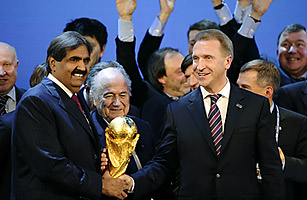 Insightful piece in TIME magazine on FIFA’s decision to stage the 2018 and 2022 World Cup tournaments in Russia and Qatar is well worth reading:
Insightful piece in TIME magazine on FIFA’s decision to stage the 2018 and 2022 World Cup tournaments in Russia and Qatar is well worth reading:
“What the World Cup Choices Tell Us About the World” by Ishaan Tharoor and Tony Karon.
WikiLeaks Targets FIFA
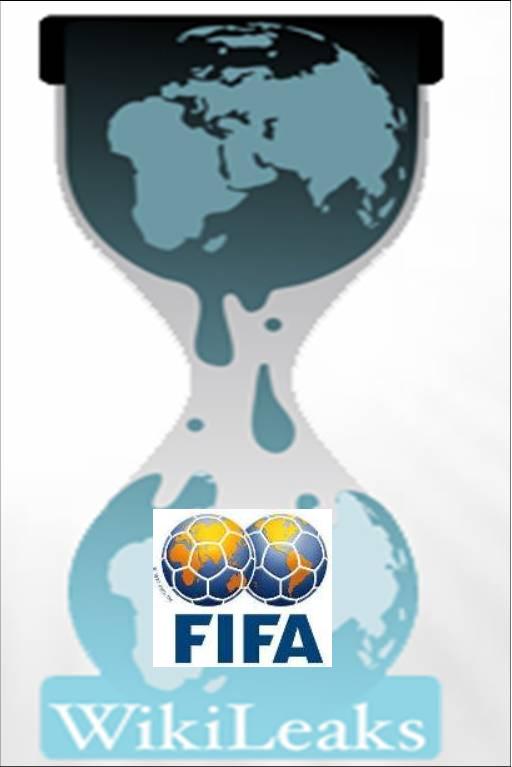
In a few hours WikiLeaks will release thousands of secret FIFA documents detailing World Cup match fixing and widespread corruption within football’s governing body.
Never before have such confidential documents been released into the public domain. The documents will give people around the world an unprecedented insight into FIFA’s activities on the shores of Lake Zurich.
The documents, which date from 1998 to 2010, contain 15,652 confidential communications between FIFA executive committee members in Zurich and corporate sponsors, media networks, and other football officials throughout the world.
But seriously, on Thursday, December 2, FIFA’s ethically challenged executive committee will award the hosting rights for the 2018 and 2022 World Cup. The stench emanating from the bidding “process” has been overpowering to the point that we — the citizens of FootballWorld — would benefit greatly from the assistance of Julian Assange and the people behind WikiLeaks.
As the work of Andrew Jennings showed, revelations of overt facts can damage the image, if not the profits, of FIFA and its corporate allies. Such information would give a vital boost to good governance in the game and instill hope for a healthy football community.
Pirates Soccer League
Maritzburg United returned to their home ground to face Orlando Pirates just five days after losing a “home” League Cup semifinal to the Buccaneers in Durban. Despite the change of venue the visitors from Soweto won again. Final score: Maritzburg United 1, Orlando Pirates 2. Check out the video for goals and the Harry Gwala stadium vibe. Full highlights here.
Football behind bars
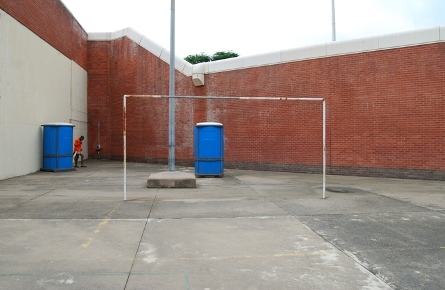
I went to prison yesterday. But only for a few hours as a heavily guarded visitor at Westville Prison — Durban’s massive correctional facility bursting at the seams with 12,000 inmates, just a stone’s throw from the huge Pavilion mall.
I was at the prison as part of the Izichwe Youth Football delegation attending a function for about 80 inmates and their families. The inmates have formed a self-help group based on restorative justice, the principle made famous by the Truth and Reconciliation Commission process. The event was sponsored by the South African National Taxi Council, the representative body of the black-owned minibus sector that carries two-thirds of South Africa’s commuters.
Part evangelical revival, part corporate social responsibility, and part community outreach, the function took place under a tent erected between the goalposts of a football pitch in the bowels of Medium “B” section. Thinking back to the story of the Robben Island prison football association told by Chuck Korr and Marvin Close, I wondered if playing the game makes the Westville inmates feel a little more human and a little less unfree.
PSL = Premier Soweto League?
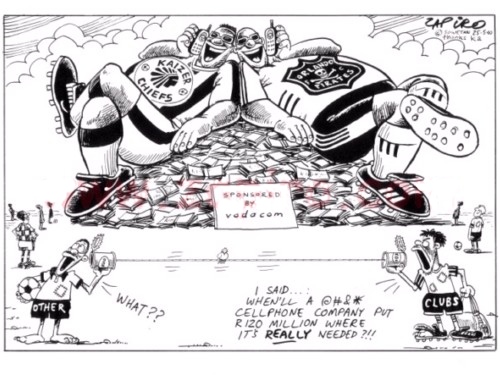
Orlando Pirates and Kaizer Chiefs will meet in the Telkom Knockout Cup final at Soccer City on December 4. That’s the fifth Soweto classic of the 2010-11 season, and it’s not Christmas yet.
With the rest of the PSL attracting small crowds after the 2010 World Cup, it is once again the two most popular and richest clubs in South Africa which are expected to generate excitement, entertainment and, most importantly, revenue.
Supporters of Pirates and Chiefs claim, with some legitimacy, that their sides fully earned the right to play in the League Cup final. Bucs fans point to their side’s pair of impressive 3-0 away wins against SuperSport United and Maritzburg United on the road to the final. The Amakhosi faithful proudly note how Chiefs’ defense has not conceded a goal in the entire competition.
But the recent controversy surrounding the selection of venue for the Maritzburg United – Pirates semifinal strongly suggests that the football-media-business complex that runs the seventh-richest league in the world massaged the outcome so that the final would feature the Soweto derby.
The story goes something like this: Maritzburg United’s shock victory against Sundowns in the quarterfinal set up a home match against Pirates. By chance, the November 21st Telkom Cup semifinal was scheduled five days ahead of a league clash between the same sides at Harry Gwala Stadium in Pietermaritzburg.
Suddenly, the PSL announced that, due to safety and security concerns at Harry Gwala, the Cup semifinal was being moved to Chatsworth stadium in Durban. League officials produced a letter from South African Police Force headquarters that allegedly prevented them from approving the 12,000-seat stadium as a Cup venue. The league’s decision proved deeply unpopular in KwaZulu-Natal’s provincial capital.
In response, Maritzburg United officials flew to Johannesburg to meet with the PSL in a last-ditch attempt to move the game back to the club’s home ground. Club officials produced an official statement by the Pietermaritzburg police that guaranteed spectators’ safety at the grounds and underlined how capacity crowds against Pirates in February and Chiefs in September were handled efficiently and without incident. Moreover, Maritzburg United’s representatives highlighted the PSL’s contradictory position, which deemed Harry Gwala stadium safe for the PSL match on Friday, November 26, but unsafe for the Cup tie.
The sending off of coach Ernst Middendorp in the 43rd minute and of substitute Felix Obasa in the 83rd simply confirmed Maritzburg’s worst fears. “For a small but competitive team like Maritzburg it’s tough enough to play Pirates on a level playing field,” wrote Marc Strydom of The Witness, Pietermaritzburg’s daily newspaper. “But when the odds are stacked against you by the PSL removing home-ground advantage then it’s even tougher.”
As the “home fans” left Chatsworth stadium, they could be excused for wondering whether PSL stood for “Premier Soweto League.”
Agudelo spoils the party: SA 0, USA 1
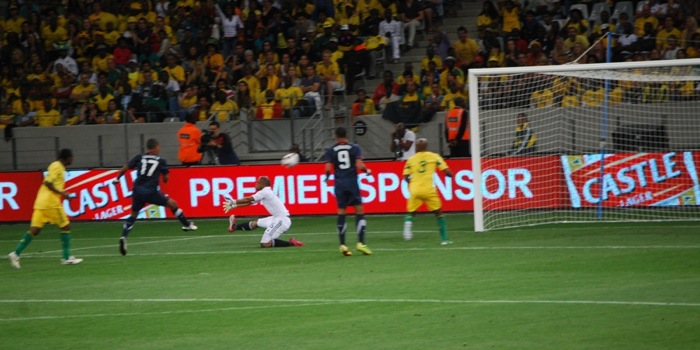
Juan Agudelo — six days shy of his 18th birthday — scored the only goal of the game in the 84th minute and spoiled a massive party in Cape Town. 51,000 of us were on hand at Green Point stadium for this glossy friendly on a warm and breezy late spring evening.
As we walked towards the ground, pubs were full of Bafana fans wearing the yellow national team shirt.
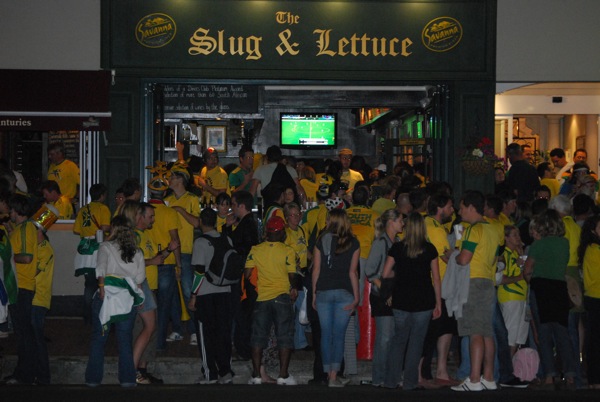
A few Americans chanted their support for the stars-and-stripes and confidently predicted a victory. The World Cup atmosphere was back (minus the FIFA branding).
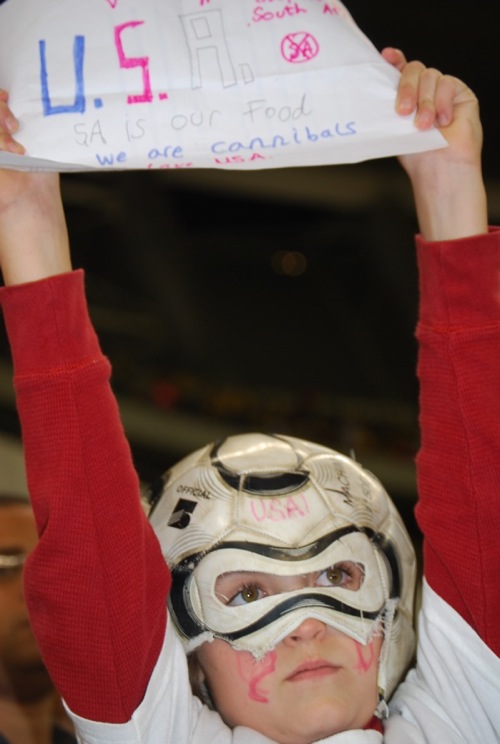
Inside the arena a welcoming vibe enveloped us. The sweet smell of football. The energy of a racially mixed and patriotic crowd. President Zuma meets the teams on the pitch. All for a good cause: the Nelson Mandela Children’s Fund. Fans belt out South Africa’s multilingual national anthem in unison: a rare, precious moment of communitas, football’s unique contribution to a fractured society searching for a shared national identity.
Unfortunately, the football on the night was crap. Let’s call a spade a spade. A strangely lethargic Bafana Bafana side knocked the ball sideways and backwards, while the second-string Americans kept their shape and every once in a while hoofed the ball forward hoping for a break. Still, the two best chances fell to the hosts who, characteristically, squandered them. 0-0 at the half. Perhaps the one silver lining for SA was Leeds striker Davide Somma’s positive debut.
Play resumed at the same monotone pace, passes going astray, nobody really able to turn defenders or take a decent shot at goal, and a series of edgy tackles that did little to improve the flow of the game. A steady stream of substitutions made matters worse. The Mexican wave takes off, a universal symbol of bored fans.
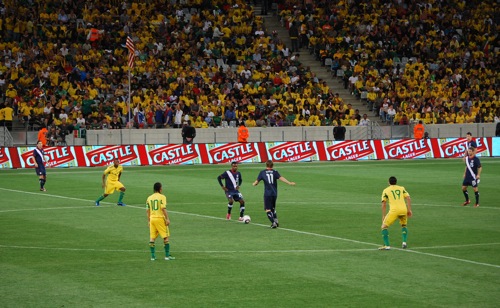
The concocted drama of penalties beckoned until the Colombian-born Agudelo, left wide open in the box, capitalized on an inviting assist by Mikkel Diskerud, a former Norwegian under-19 international whose mother is American. Bafana pressed for the equalizer, but it was too little too late.
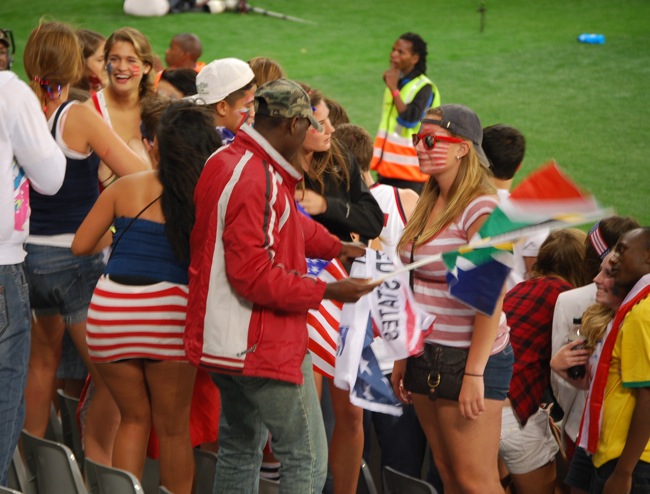
As the home crowd filed out quietly, a group of vociferous American college students wrapped in red-white-and-blue began their celebrations. I couldn’t help but think back to the last time South Africa played in Cape Town: a 3-1 loss to Zambia in September 2007. Is the Mother City cursed?